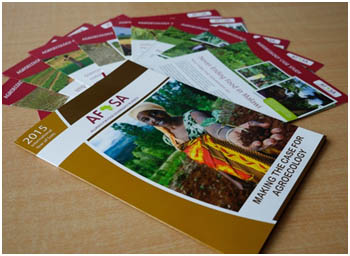Issue : 2 Article : 1
Agroecology - The Bold Future For Africa

|
African civil society organizations and networks embracing hundreds of millions of small-scale producers are urging African governments to adopt agroecology as the future of farming in Africa. Gathered together under the banner of the Alliance for Food Sovereignty in Africa, the ‘continental network of networks’ has just launched a new series of African case studies to show the benefits of agroecology.With 74 case studies now online - 23 in French, 51 in English -the collection makes a solid evidence-based case for agroecology as the sustainable food system for Africa. The case studies show that agroecology leads to substantial increase in income, higher yields and productivity, improved nutrition, health and food security, increased soil fertility, crop diversity, and resilience, lower risk, reduced dependence, enhanced social capacity, and leadership. AFSA launched the new series of case studies at the FAO Regional Symposium on Agroecology for Food Security and Nutrition in sub-Saharan Africa, in Dakar 5-6 November 2015. The growing global agroecologymovement recognizes that industrial agriculture is a dead end. It claims to have raised yields in places;but it has done so at great cost, with extensive soil damage, huge biodiversity loss and negative impacts on nutrition, food contamination and groundwater pollution. Agroecology is the antithesis of conventional, corporate-driven, monoculture-based farming systems. |
 |
Where conventional agriculture seeks to simplify, agroecology embraces complexity. Where conventional agriculture eliminates biodiversity, agroecology celebrates it. Where conventional agriculture de-skills farmers, agroecology is knowledge-intensive, building on traditional agricultural practices with modern research and technology to put farmers in control. Where conventional agriculture offers one-size-fits-all fixes such asGenetically Modified Organisms(GMOs), chemical fertilizers and pesticides,agroecology provides local solutions to local problems. Where conventional agriculture pollutes and degrades,agroecology regenerates and restores, resisting climate change, working with nature - not against her.
Elizabeth Mpofu,La ViaCampesina International General Coordinator, commented: "Agroecology makes food production more secure regardless of what the weather brings. Agroecology promotes food sovereignty and ensures everyone's right to food. As small-scale food producers,agroecologylimits our reliance on external inputs. We harvest and save our seeds; we make our own organic fertilizers and control pests using traditional methods."
"We are calling our governments to support and promote agroecology practices instead of industrial food production systems that are a false and temporary solution. We need our governments to protect us and ensure our children a future, in which they can feed themselves with nutritious food supported by a healthy environment!"
The case studies are available online in both English and French at http://afsafrica.org/case-studies/
AFSA has also issued a statement to mark the FAO Agroecology event, calling on African leaders to redirect their efforts towards agroecology – the future of farming in Africa! The statement is available at http://afsafrica.org/agroecology-the-bold-future-for-africa/
